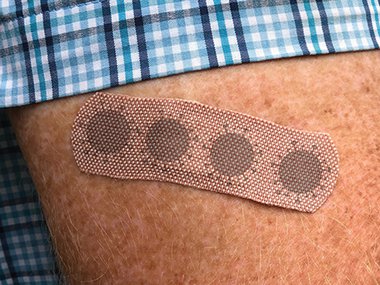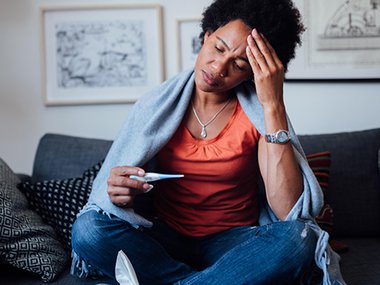Sometimes you just feel terrible. Tired, achy, overly sensitive, and you have no energy to do much of anything, especially socialize or shower. Sometimes this also comes with a headache, scratchy throat or queasy stomach … or even worse, all three! With the strength you can muster, you try to puzzle out what’s causing us to feel bad so you can do whatever is needed to feel better.
Is it the flu? A cold? Something more serious?
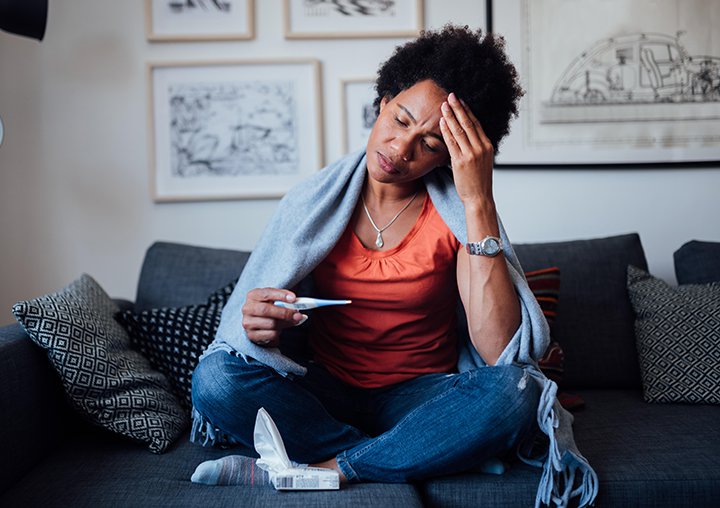
Image credit: Getty Images
There are hundreds of viruses that cause what we know as the common cold. Almost every time you catch a cold, you’ve been infected with a new virus. There are more than 200 kinds of rhinoviruses that cause up to 40% of our colds, and aren’t usually too bad. There are more than 30 kinds of coronavirus, but only a handful of them affect humans (with a range of severity). There are other viruses we know about, like RSV and parainfluenza, and there are a bunch that we don’t know yet.
So why do all these viruses make you feel the same way? How can hundreds of organisms all know how to stuff up my nose and make me tired and unmotivated?
Well, they don’t. Your body is doing all this to itself.
Your immune system is charged with the job of defending you from invaders. Maybe you’ve seen Osmosis Jones and have had a primer? (If not, we recommend this as a fun at-home learning activity for the family!) White blood cells are rushing around your body, constantly patrolling and deploying specialized teams to fight off various attacks.
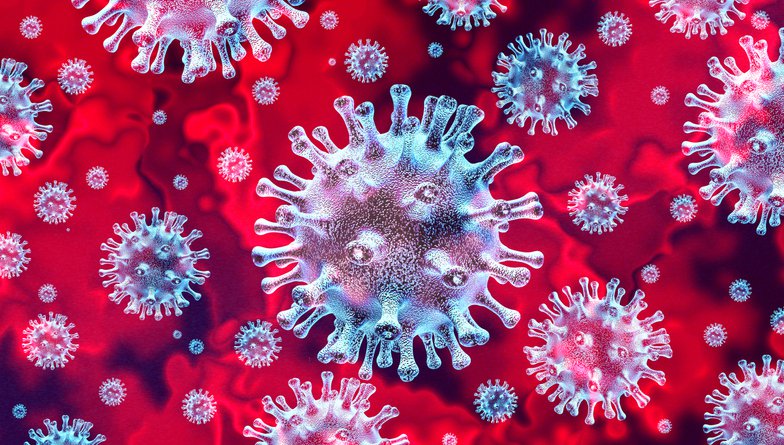
Image Credit: Getty Images
Your immune system hits the histamine switch in your brain, which kicks up the activity of your mucus glands and swells up your nose to send more fluid and blood cells to that area for defensive purposes. Coughing is triggered by dripping mucus and swelling in the bronchioles deep inside the lungs, helping you trap and expel excess mucus and invaders. The immune system creates all those symptoms in an effort to fight a current infection and also defend harder against getting infected by something else while you’re already down.
So, what about the behavioral part where you're feeling icky? Why don’t you want to talk to anyone?
It used to be thought that you feel tired when you are sick because all of your energy was going to your immune system. That’s partly true as your immune system might use a little extra energy, but not enough to account for what we know as sickness behavior.
What’s actually happening is a little more complicated. Your immune system and brain are talking to each other.
The leukocytes (white blood cells) of your immune system are releasing proinflammatory cytokines. Cytokines are tiny proteins that have a bunch of functions in your body, and are important for the immune response and cell-cell communication. One of the things cytokines do is trigger the release of prostaglandins, which are a special kind of hormones involved in illness and injury response.
Prostaglandins can be released from almost any cell in the body (and that is 37.2 trillion cells per human body, in case you’re counting!) and they are small enough and special enough to cross the blood-brain barrier. The blood-brain barrier keeps most substances in your bloodstream out of your brain (which is good, because it protects your neurons from drugs, poisons, infections, and all sorts of damaging things). Prostoglandins can get into the brain and talk to your neurons, and they head (pun intended!) straight for the hypothalamus.
The hypothalamus is a small command center deep in your brain. Imagine if you went from the top of your ears straight into the middle of your head—the center is where the hypothalamus would be. The hypothalamus has control over many of your bodily functions, and when it is stimulated by prostaglandins, it can produce fever, sleepiness, lack of energy, lack of appetite, loss of sex drive, and more.
Quick summary: your immune system releases cytokines, which release prostaglandins, which trigger the hypothalamus to get you to start behaving in a certain way. Your immune system creates sickness behaviors and sensations, not the illness itself.
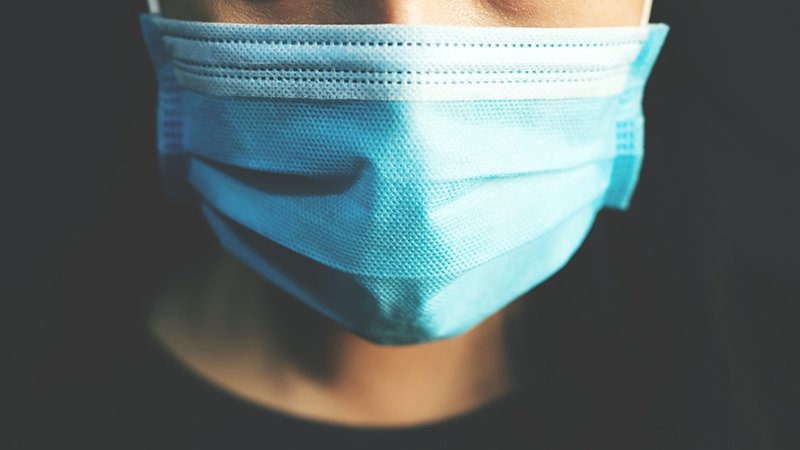
Image Credit: Getty Images
Wouldn’t it be nice if it could fight off these invaders without you feeling miserable? Why is your own body making you feel bad? Physiologically, there’s a whole network that has to operate just to make you feel run down. It’s not a byproduct of the system ... your body goes out of its way to produce those things we associate with sickness. What the heck?!
Since the immune system is energetically expensive—meaning you have to spend precious internal resources on it—scientists thought for a while that sickness behavior must have an evolutionary advantage. “Feeling bad must mean that my body is fighting extra hard. Or that I’ll be extra healthy after this infection. Or it must improve individual fitness. This is it, right?!”
But it might not. Instead, scientists now recognize that an individual’s sickness behavior doesn’t make that individual better, but instead it protects others.
It’s called the Eyam Hypothesis, after a community in England that isolated itself in 1666 during a bubonic plague outbreak. This action resulted in 75% of their population dieing but it protected surrounding communities. (Research has suggested this concept for a long time, but it wasn’t formally named until 2015.) If you stay huddled in your room because you feel too awful to interact with others, then relatives don’t get sick and will survive. Kin selection suggests that even if you die, your genes (including the genes for sickness behavior) get passed on better because you've protected your family. So that means sickness behaviors are actually a form of biological altruism: you feel terrible and hide out so others don’t have to get sick.
Sickness behavior exists in many species and scientists have observed it throughout the animal kingdom. The study of illness behaviors spans a number of disciplines, including sociology, psychology, and biology.
Your body wants you to stay home when you are sick to care for yourself and for others. Too often we fight that inclination. For generations we have forced ourselves back into circulation before we’ve fought off the infection. We pop pills to override those natural functions. Aspirin and ibuprofen work by inhibiting prostaglandins, so they decrease fever and other signs of illness. By doing this, we spread those colds and flus rampantly at workplaces, schools, restaurants, stores, and parties. Despite our medical knowledge and technology, tens of thousands die annually from complications of these viruses (and manyfold more deal with financial burdens due to caregiving responsibilities related to these illnesses).
And now the SARS-Cov-2 virus is thriving in our social species. Many people, accustomed to carrying on with life with mild illness symptoms, are spreading this virus before they ever know they have it.
The virus can be easily passed unless we implement sickness behaviors without even being sick. We must stay home, stay distant, cover our respiration (i.e. wear a mask!), and otherwise keep our germs out of circulation in order to protect each other. While the coronavirus isn’t as lethal as the bubonic plague, perhaps we can learn something from the Eyam community. Let’s take our smartphones, Netflix, and Nintendo's back to 1666 and continue to stay home and isolate to prevent the continued spread of this disease.
